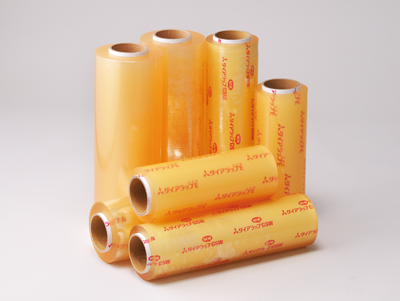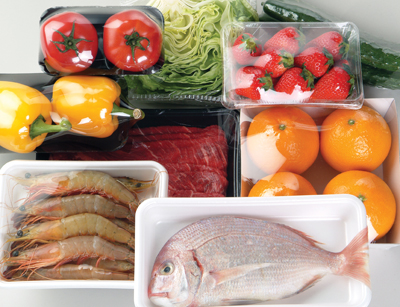Inquiries Concerning News
Corporate Communications Div.,
The Mitsubishi Chemical Group
TEL: +81-3-6748-7140
Mitsubishi Plastics develops a PVC stretch film for commercial food packaging,with a significant inhibition of plasticizer migration
Mar. 5, 2012
Mitsubishi Plastics, Inc. (head office: Chuo-ku, Tokyo; President Hiroshi Yoshida) has developed a polyvinyl chloride (PVC) stretch film for commercial food packaging that can effectively inhibit plasticizer1 migration. The plasticizer used for the film is based primarily on plant source materials, for the first time in the industry.
Mitsubishi Plastics manufactures “DIAWRAPTM”, the industry’s top brand of commercial stretch films for packaging of fresh and processed food at supermarkets and other food retails. There are two basic types of commercial stretch films: polyolefin-based and PVC-based. Generally PVC-based stretch films contain about 30% plasticizer in its composition in order to increase flexibility and adhesiveness. However, it is reported that a small amount of migration of plasticizer into the food will occur if the film is used to wrap fatty processed foods. The types of plasticizers and the migration limits having no effect on the human body are defined under the Food Sanitation Act as well as industry’s self-regulations2. While strictly complying with the standards, the Company has been working proactively to provide safer products to consumers by developing plant-based products that can inhibit the migration of plasticizer.
The new PVC stretch film uses a plasticizer which is based primarily on plant source materials. As a result, the plasticizer migration is reduced by around 50%, compared with that of the Company’s conventional products, even when the film contacts with fatty food. At the same time, it still maintains the same standard of packaging properties as the conventional ones in terms of quality. Furthermore, the weight of the film is reduced by around 10% by achieving higher durability and reduced thickness after the change of plasticizer materials, which leads to a reduction of waste.
The new PVC stretch film will be launched this autumn after undergoing necessary performance evaluations in the market. Mitsubishi Plastics strives to realize the vision of “KAITEKI3” advocated by Mitsubishi Chemical Holdings, by proactively developing and commercializing innovative eco-friendly packaging materials that can meet its customers’ needs.
1 Plasticizer: This is a substance that is generally added to PVC formulation to enhance flexibility and other features of the end product. Ester, a chemical compound formed from an acid and an alcohol, is most commonly used for plasticizers in the industry.
2 Migration limits: Migration limits in various kinds of migration tests are regulated by the Ministry of Health, Labour and Welfare. For example, for a migration test where the maximum volume of migration of plasticizers is expected (food-simulating solvent: n-heptane; test conditions: 25oC x 60mins), the migration limit for PVC packaging films is 150ppm.
3 KAITEKI: A challenge to attain the state of sustainability, materializing comfort for people, comfort for society and comfort for the Earth.
[Photo]

“DIAWRAPTM”

Packaging examples of “DIAWRAPTM”
The product is designed to offer domestic customers in principle: there will be a need for various procedures for confirmation in the case of export.
Inquiries by media regarding this material should be directed to the
Public Relations Section, General Administration Dept., Mitsubishi Plastics Inc.
TEL: +81-3-3279-3800
